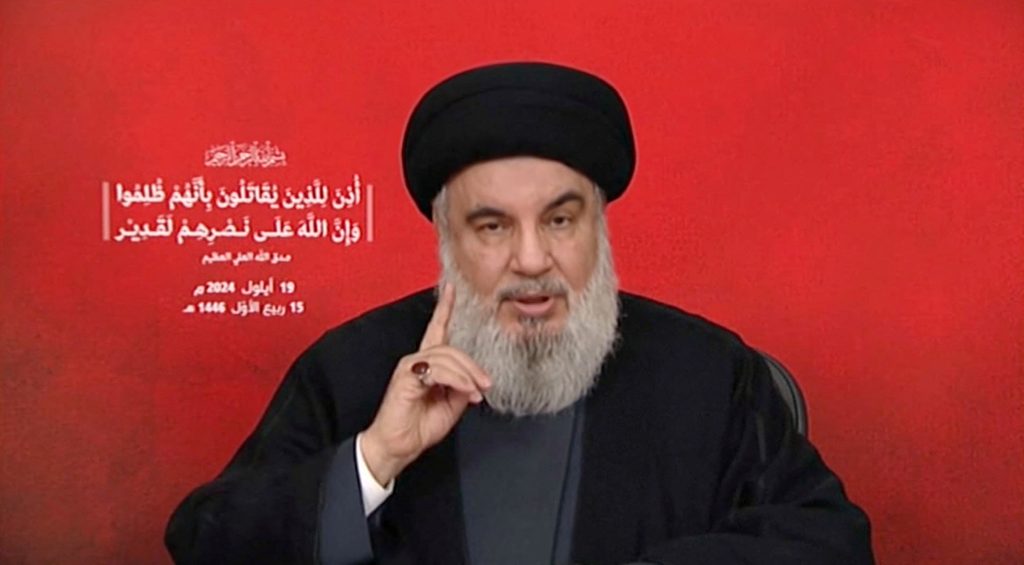By Agency Report
Lebanon’s Hezbollah group confirmed on Saturday that its leader and one of its founding members, Hassan Nasrallah, was killed in an Israeli airstrike in a southern suburb of Beirut.
The killing of the powerful militant group’s longtime leader sent shockwaves throughout Lebanon and the Middle East, where he has been a dominant political and military figure for more than three decades.
Nasrallah has been on Israel’s kill list for decades. His assassination is by far the biggest and most consequential of Israel’s targeted killings in years.
The Israeli military said it carried out a precise airstrike on Friday while Hezbollah leaders were meeting at their headquarters in Dahiyeh, south of Beirut.
In a statement on Saturday morning, September 28, the IDF said: ‘The IDF will continue to harm anyone who promotes and engages in terrorism against the citizens of the State of Israel.
‘Fighter jets of the Air Force under the precise intelligence guidance of the intelligence wing and the defense system, attacked the central headquarters of Hezbollah, which is located underground, under a residential building in the Daha area of Beirut.’
Immediately after the confirmation from Hezbollah, people starting firing in the air in Beirut and across Lebanon to mourn Nasrallah’s death.
“Wish it was our kids, not you, Sayyid!” said one woman, using an honorific title for Nasrallah, as she clutched her baby in the western city of Baabda.
“We don’t believe he is killed,” a woman draped in black, tearfully told al-Manar TV in Bekaa, western Lebanon. “We don’t. We left our homes and came here for him and for the resistance,”
The Lebanese Health Ministry said six people were killed and 91 injured in the strikes, which leveled six apartment buildings. Ali Karki, the commander of Hezbollah’s Southern Front and other commanders were also killed, the Israeli military said.
A statement from Hezbollah said Nasrallah — who led the group for more than three decades — “has joined his fellow martyrs.” The group vowed to “continue the holy war against the enemy and in support of Palestine.”
Hezbollah started firing rockets on Israel in support of Gaza on Oct. 8, a day after Hamas militants launched an unprecedented attack on Israel, killing some 1,200 people and abducting another 250. Since then, the two sides have been engaged in escalating cross-border strikes.
Earlier this month, thousands of explosives hidden in pagers and walkie-talkies used by Hezbollah detonated, killing dozens of people and maiming thousands, including many civilians. Israel is widely believed to be behind the attack. Israel has killed several other top Hezbollah commanders in Beirut, especially in the past two weeks, in addition to the attack that killed Nasrallah.
In Beirut’s southern suburbs, smoke rose and the streets were empty Saturday after the area was pummeled overnight by heavy Israeli airstrikes. Shelters set up in the city center for displaced people were overflowing. Many families slept in public squares and on beaches or in their cars.
On the roads leading to the mountains above the capital, hundreds of people could be seen fleeing on foot, holding infants and whatever belongings they could carry.
The Palestinian militant group Hamas sent condolences to its ally, Hezbollah, and said “assassinations will only increase the resistance in Lebanon and Palestine in determination and resolve.”
News of Nasrallah’s killing stunned travelers at Lebanon’s only international airport, where hundreds of people were scrambling to leave the country despite limited flights. Some cried. Others talked on their phones in disbelief. One woman screamed: “No! It was just an announcement! No, he didn’t die!”
Iran’s supreme leader announced five days of public mourning after Nasrallah’s death. Ayatollah Ali Khamenei called Nasrallah “the flag-bearer of resistance” in the region.
Hundreds of protesters meanwhile took to the streets of Tehran, waving Hezbollah flags and chanting “Death to Israel” and “Death to Netanyahu the murderer.”
Hezbollah
Hezbollah is both a Shiite Muslim party and a militant group. It is anti-Israel and gets it’s funding from Iran, Israel’s arch-enemy.
It has supported Hamas since the start of October 7 conflict between Israel and Palestine.
Nasrallah, who hasn’t appeared publicly for years for fear of being assassinated, has personal links to Iran and helped to militarise Hezbollah, training members of Hamas and militias in Yemen and Iraq.
Nasrallah was born in 1960 in Beirut, before later joining the Amal movement, a Shia militia, during the Lebanese Civil War in 1975.
Nasrallah became leader of Hezbollah in 1992 after the former leader was killed in a helicopter strike.

